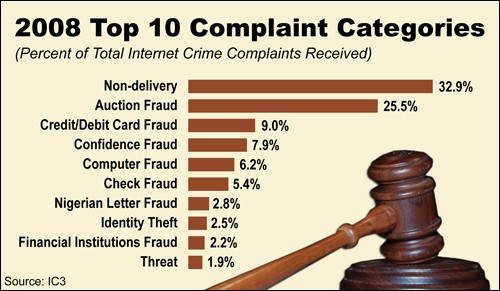Computers, sports memorabilia, rare coins, designer fashions, and even cars.
These are just a few of the items offered for sale every day on legitimate online auction sites. They're also just a small sample of the items used to lure unsuspecting victims into online auction fraud schemes.
Most of the one million-plus transactions that take place each day on these websites are legitimate; just a fraction actually result in some type of fraud.
But even that fraction adds up. According to the latest report of the Internet Crime Complaint Center (IC3), more than 70,000 complaints made to IC3 last year -- about one in every four -- involved online auction scams.
There are a variety of auction frauds, but here are some of the more common ones to watch out for:
What are they? Find out after the jump...
- Overpayment fraud targets the seller. A seller advertises a high-value item--like a car or a computer--on the Internet. A scammer contacts the seller to purchase the item, then sends the seller a counterfeit check or money order for an amount greater than the price of the item. The purchaser asks the seller to deposit the payment, deduct the actual sale price, and then return the difference to the purchaser.
- Wire transfer schemes start with fraudulent and misleading ads for the sale of high-value items being posted on well-known online auction sites. When buyers take the bait, they are directed to wire money to the crooks using a money transfer company. Once the money changes hands, the buyer never hears from them again.
- Second-chance schemes involve scammers who offer losing bidders of legitimate auctions the opportunity to buy the item(s) they wanted at reduced prices. They usually require that victims send payment through money transfer companies, but then don't follow through on delivery.
And needless to say, in all of these schemes customers never get what they pay for.
Who is behind the scams. Mostly individuals. However, there are exceptions: criminal enterprises from West Africa are especially fond of the overpayment scams, while Romanian crime groups favor the second-chance schemes.
We're working to address the problem. We've had a number of successful auction fraud investigations, worked collaboratively with other agencies, including



